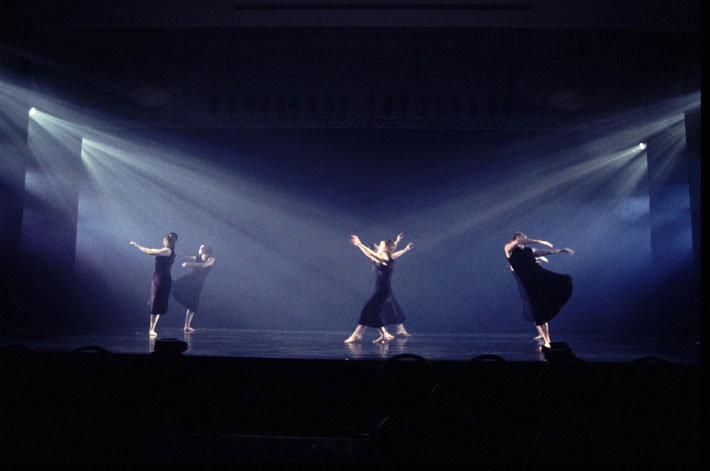 |
 |
 |
 |
 |
 |
 |
 |
 |
 |
 |
 |
|
|
|||||||||||||||
|
|
|||||||||||||||
|
|||||||||||||||
|
|
|||||||||||||||
Course Objective:
To give the student a basis to better understand and appreciate the art of Theatre. This will be accomplished;
1) through the exploration and study of the components of the theatre
and how those different parts work together;
2) by looking at the history of theatre;
3) developing standards for critical evaluation of theatrical productions
through attendance and subsequently writing about these productions.
This course covers the fundamentals of the process of the theatre. The
development of the artistic team in practical theatrical applications is studied
through class projects and critique of the productions at CalRep and University
Theatre. Learning how to “see” and developing points of view and approaches
are also studied. The course will also briefly cover the business of design,
working on Broadway and the Regional Theatres, and other professional venues.
A series of “Designers’ Forums” will be presented to the class. These forums
will include open discussion regarding the process of the university productions,
and how the designers adapted to the challenges.
Requirements:
IMPORTANT!
FLEX-PASS. MUST BE PURCHASED BY FEBRUARY 1 IF YOU WISH TO PARTICIPATE
IN THE COURSE. FLEX PASSES ARE $60.00 AND CAN BE PURCHASED AT THE THEATRE
ARTS BOX OFFICE MONDAY - FRIDAY 8:00am - 12:00noon.
1. Attendance is MANDATORY. Attendance will be taken promptly at 9:30AM.
Students are allowed 5 absences, each subsequent absence will result in
the lowering of one letter grade (for example, 6th absence equals an automatic
B, 7th a C, 8th a D, etc.). In the case of extreme illness, proper documentation
is needed for the absence to be excused. There will be no exceptions made.
2. STUDENTS ARE REQUIRED TO SEE ALL THE PLAYS. The FLEX PASS enables you to see all 5 shows. The cost of the FLEX PASS is $60.00. YOU MUST HAVE THE FLEX PASS BY FEBRUARY 1 TO CONTINUE IN THE COURSE. ON FEBRUARY 1 YOU MUST BRING THE PASS TO CLASS TO GET 20 POINTS CREDIT. You must attend ALL SHOWS. After you view the performance, take your ticket stub to an usher or to the house manager to be stamped. Ticket stubs will be collected in class the Tuesday after each show closes. You will be given 10 points for every ticket stub. STUBS MUST BE STAMPED TO VERIFY THAT YOU STAYED FOR THE ENTIRE PERFORMANCE, OR NO CREDIT WILL BE GIVEN. IF FOR SOME REASON YOU HAVE FORGOTTEN YOUR STUB, YOU HAVE UNTIL 5:00pm TO PUT THE STUB IN AN ENVELOPE IN THE INSTRUCTOR'S MAILBOX. NO LATER. STUBS ARE COUNTED AT 5:05pm. STUBS FOR THAT PARTICULAR SHOW WILL NOT BE ACCEPTED AFTER THAT TIME.
3. All written work that is turned in will be double spaced and typed. There are a number of computers available on campus to meet this need. Work that is not typed will not be accepted. You may e-mail your work directly to me at djacques@csulb.edu.
Students will write 5 1-2 page papers during the semester, one on each
show. Before each show opens a question pertaining to the play will be posed
by the instructor. This will serve as a jumping-off point for the papers.
The papers must be 1-2 pages long, answering the question as articulately
and as thoroughly as possible. The papers must be well written to receive
credit.
Papers are due the first class following the run of each show. Papers
will be
accepted until 5:00 pm on that day. UNDER NO CIRCUMSTANCES WILL LATE PAPERS
BE ACCEPTED!
Extra Credit - Students may receives 10 points extra credit for the stamped
ticket stub for attending outside productions. In that case you need to have
a ticket stub, program, and a one-page critique of one actor's performance
in the show. No other extra credit is available for missed plays, absences,
etc..
ASSIGNMENTS AND GRADING:
There will be one mid-term exam and one final exam based on information from the lecture/discussions and productions.
There will be 5 10-point quizzes on the shows during the class period
following the close of each show.
FLEX PASS
20 pts.
5 1-2 page papers
100 pts. (20 points per paper, 5 papers)
Ticket Stubs
50 pts. (10 points per stub)
Quizzes
50 pts. (5 10-point quizzes)
Midterm
40 pts.
Final
50 pts.
Participation
40 pts.
TOTAL 350 pts.
SCALE:
315 - 350
A
280 - 314
B
245 - 279
C
210 - 244
D
209 and Below F
Very Important!
Drops after the drop deadline will only be permitted under extreme circumstances and if the student drops the rest of their classes at CSULB.
Website: www.csulb.edu/~djacques/
All of professor Jacques’ essay assignments along with the complete
PowerPoint lecture presentation are located on the website. Make sure you
have a speedy connection to view the PowerPoint presentation.
Class Structure
1. Introduction and Class Structure Review
Why are we theatrical artists?
2. What is Theatre?
Video: Waiting for Guffman
3. What is a Play?
4. The Dramatic Imagination
5. History: The Greeks
Video: Medea
6. The Middle Ages
7. The Shakespearean Era
Video: Shakespeare In Love
8. Kabuki—and the Theatre of Asia
9. The Royal Theatre
10. The Modern Theatre: Realism
Video: Death of a Salesman
11. The Modern Theatre: Anti-Realism
12. Theatre Today
Musicals
Video: Sweeny Todd
13. The Actor
14. The Playwright
15. Designers and Technicians
16. The Director
17. The Critic
18. The Process
